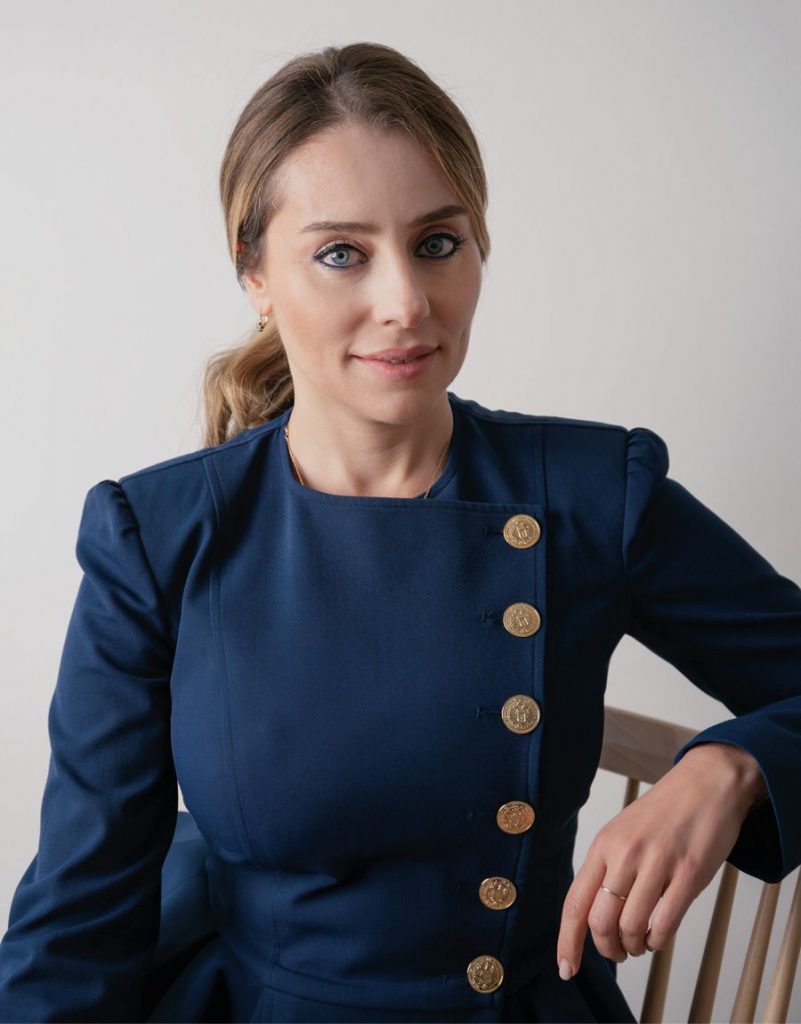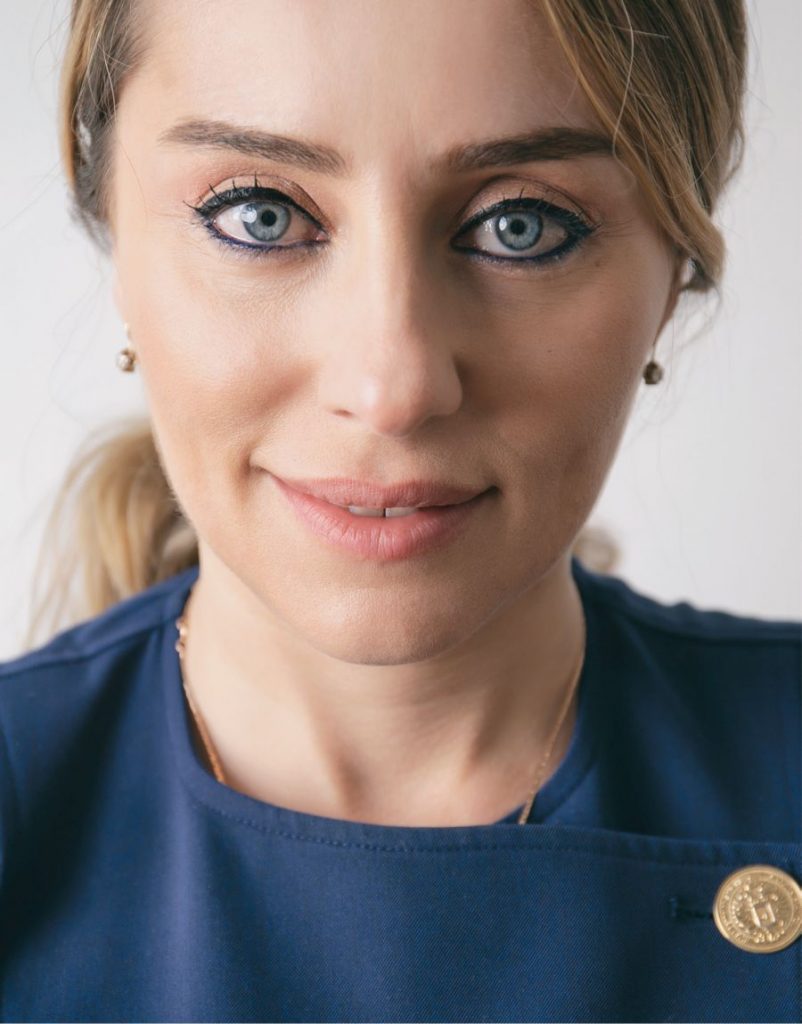
After receiving international education in the Czech Republic, the United States, and Italy, Keti Bochorishvili became even more actively involved in the country’s development. In different periods, her job activities were related to such important institutions and projects as Anaklia City; 7 years of experience in the Ministry of Economy in various important areas: tourism, entrepreneurship development, investment attraction, and more. More years of experience, successful implementation of the most important projects for the country, and a future-oriented attitude is the foundation on which the young global leader of the World Economic Forum – Keti Bochorishvili builds her global vision.
In the framework of the joint project, “She’s Next”, Forbes Woman Georgia and VISA present an interview with Keti Bochorishvili, in which she shares her experiences and future visions, which will help readers better understand the challenges, barriers, and opportunities that women entrepreneurs face.

What were your main sources of inspiration and motivation that pushed you to get involved in business and economic development?
Since our country is developing, my work in this field is related to involvement in the processes necessary for development. When I saw the need for development and innovation, it was then that I got involved in activities that would allow me to contribute to the progress of the country. The pursuit of change also stems from my character. However, for me, the fight for change was never limited to just personal provision, just the fact that, for example, I wanted a good house, a secured environment, and so on. I realized that my motivation in this direction was much broader and meant creating a line of development that would benefit other people.
It all started when I first came to the US when I was 15 years old. It was then that I realized what quality life meant, even in everyday matters – I understood what it meant to have constant electricity, water, etc. However, the most important achievement and discovery was a quality education. In the educational institutions there, the diversity of views was felt, no one was ashamed to express an unpopular opinion. This played a crucial role in shaping my identity. Based on this experience, I developed the ability to look at any issue from different angles.
In the late ’90s, I came back from America at the age of 17 and I remember the first thing I did – I wrote a document in which I wrote about the changes that had to be made in school. I went to the school principal and told him that it was necessary to think about these changes and then take coordinated action. Consequently, it was during this adolescence that such sentiments and constant striving for change and development occurred in me and these became a foundation on which my various activities were then built.
What should each person do to be involved in the development of the country, to conclude specific experiences and, consequently, contribute to the progress of the country?
We are a very flexible nation. If we want, we can have a pretty impressive rate of economic growth and development. This is evidenced by the rapid, effective, and fundamental reforms implemented in the past, the results of which have already been reflected in the work of various institutions of the country or the welfare of the nation. The stage of development we have reached is truly amazing, though it should not be a cause for complacency and relaxation. We need more hard work, more effort, more thinking.
When it comes to the efforts of specific individuals and their contributions – there is no universal formula. However, one truth I can cite as an example – individuals who deny the need for self-realization and self-development create an environment that translates into a hopeless collective. We must realize that our success or prosperity cannot be perfect if we live in an unstable environment and country. Accordingly, the mission of both the state and the private sector and in general should be to encourage and support each other to mobilize people and focus their resources on a hopeful future.
Listening to the community and specific people is also important for the country to move forward. Observing problems and ideas is crucial. Great ideas, and, most importantly, successfully implemented ideas – aren’t born in offices. My experience has taught me that too – the idea of every project that has been successfully implemented has come out as a result of communication with people, business relationships, and traveling to the regions. I listened to their problems, grouped them, and made large-scale decisions that would bring about positive change, not just for one individual – but a specific group of people. Accordingly, each individual and society, in general, need to set a specific task and then use all the tools to achieve this common goal.
Are there any difficulties and challenges related to your vision for the future of the country’s economy and business, as well as for the development and implementation of start-up professionals?
We have to agree on what sort of country we want to live in. We have to agree on what our vision is for the development of this country. What kind of country do we want to have, for example in 5 years, or 10 years? Nowadays we all live a simple daily life we go inertial – with the instinct of survival. It affects every element of our lives and the general quality of life. Time should not rob us. This is important. It is important to lay the groundwork for initiatives that will benefit and yield results in the long run. We need to create a common vision that will set the tone for the business and the state.
As an experienced female professional who has held various leading positions in different periods, you have had to overcome many obstacles. Was one such obstacle gender discrimination?
There are many gender stereotypes around us. I have had projects in my work experience when I was the only woman sitting at the negotiating table. In such cases, it was difficult to push my ideas and opinions, especially when I was still young and inexperienced. Partially, the picture is the same now, women constantly need to prove that we have smart thoughts, we have good ideas and we have the skills and knowledge needed to implement those ideas. Whenever I read an article in which women talk about their problems, including very influential and powerful women, I often think they write about my experience. I realize that these problems affect all women. However, being under such pressure automatically brings some benefits as well. Personally, because of these circumstances, I am constantly in search of action and new challenges. One of the problems with the role of women in business is that not enough women are represented in top management. We should not be misled by the increase in women’s employment. Women must have equal opportunities to achieve leadership roles.
On this issue, I would like to recall one moment. When we met Christine Lagarde, she shared her approach to the process of women’s empowerment. She travels to different countries and meets private companies, asking why they do not have women on the supervisory board. The common answer from companies is that they cannot find competent women. Lagarde has prepared lists of women that she offers these companies and advises to employ women on these lists. She does it to prove that in case of desire, a little effort is needed to find a competent woman. That’s true – as soon as we try, we discover that there are many women around us – with many opportunities. Therefore, one of our missions as women should be this – to support other women and help them.

What advice would you give to young female entrepreneurs who are now planning to start a business or other activity in their field?
It is important to spend the necessary time on correct and effective communication. It is important to have effective negotiations with all stakeholders and thinkers and to have effective detail-oriented communication because without it any project will face many shortcomings. One of my tools, including preventing obstacles in advance, is to produce effective communication with all stakeholders.
The post-pandemic period will provide a somewhat good opportunity for novice female entrepreneurs to explore their role in a new, changed world. Consumers changed, their behavior changed, we all changed. Working conditions have changed. Lots of companies have switched to remote work mode, which opens up new opportunities for many women, because if until now physical presence in the workplace was a barrier for many women, now this barrier has been somewhat removed. The post-pandemic period also brings new professional needs and more opportunities.
We will not forgive ourselves for not using this period to form a global vision, to look far ahead, to think more broadly, and to define how our ideas will bring success to the changing business sector, the country’s economy, and the well-being of society.
What are your plans related to? What is the next goal? What’s next for you?
I think a lot about the future, especially about the lessons that the pandemic has taught us. I think that my main axis of activity will not change – I will still be involved in the development processes of the country.

